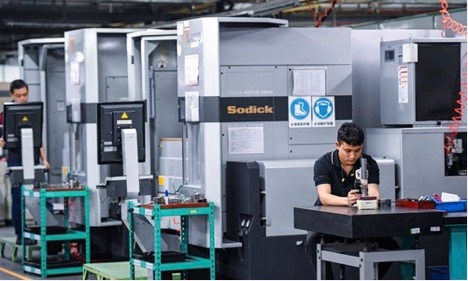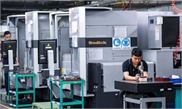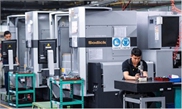Foxconn, Pegatron refute reports on shift to Mexican factories
Foxconn, Pegatron refute reports on shift to Mexico

Workers are seen at a workshop in Longhua science and technology park of Foxconn Technology Group in Shenzhen, south China's Guangdong Province, Feb 22, 2019. (Xinhua/Mao Siqian)
Electronics manufacturers Foxconn and Pegatron have refuted a media report alleging they plan to move their global supply chains out of China and build factories in Mexico, saying they have no plans to increase investment there, the Global Times learned Tuesday.
While sources in the report cited risks in manufacturing in China, experts said that shifting supply chains abroad would mean greater uncertainties for the companies, and it is unlikely to occur any time soon.
"While we are an active investor in Mexico, we can confirm that we have no current plans to increase those investments and any reports to the contrary are untrue," said a statement by Foxconn.
Pegatron also denied the report, saying that it doesn't have any plans to establish new factories in Mexico. "We have a factory in Mexico mainly to provide maintenance service," a representative from the company told the Global Times Tuesday.
The companies are important contractors for smartphone brands such as Apple. According to a report by Reuters, Foxconn and Pegatron are considering building factories in Mexico as concerns over the US-China trade war and the COVID-19 pandemic rise.
The supply chain for electronic products in Mexico is not as complete as in China, and there are not as many trained workers as in China, Xiang Ligang, an industry analyst, told the Global Times Tuesday.
"To make an iPhone requires hundreds of parts and close cooperation among different companies. Mexico lacks such experience," he said.
Foxconn announced plans to build factories in the US state of Wisconsin in 2017. The $10 billion project was expected to provide jobs for 13,000 people.
However, the Wisconsin facilities, which were scheduled to be completed by the end of 2020, were still largely empty in April this year, according to media reports.
Compared with Mexico where labor costs are cheaper, the challenges of building a factory in the US are even greater, Xiang said.
"US workers' wages are high and labor unions are strong. Many US employees may be unwilling to work overtime to keep a plant running at full capacity, which could lead to soaring labor costs," he said. "If production lines are switched to the US and South America, companies risk potential losses in revenue."


